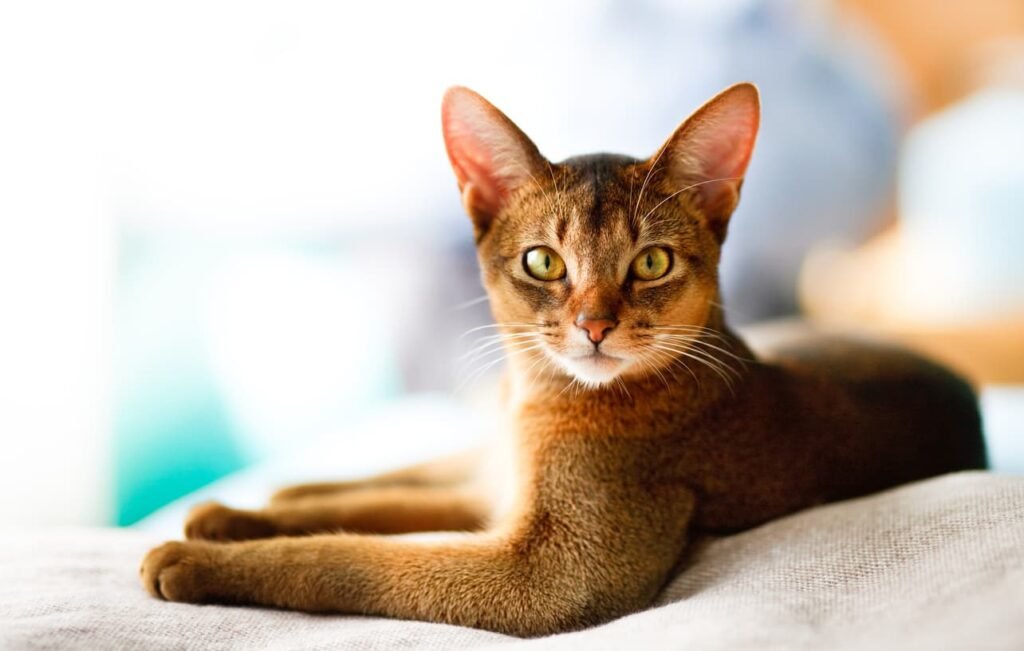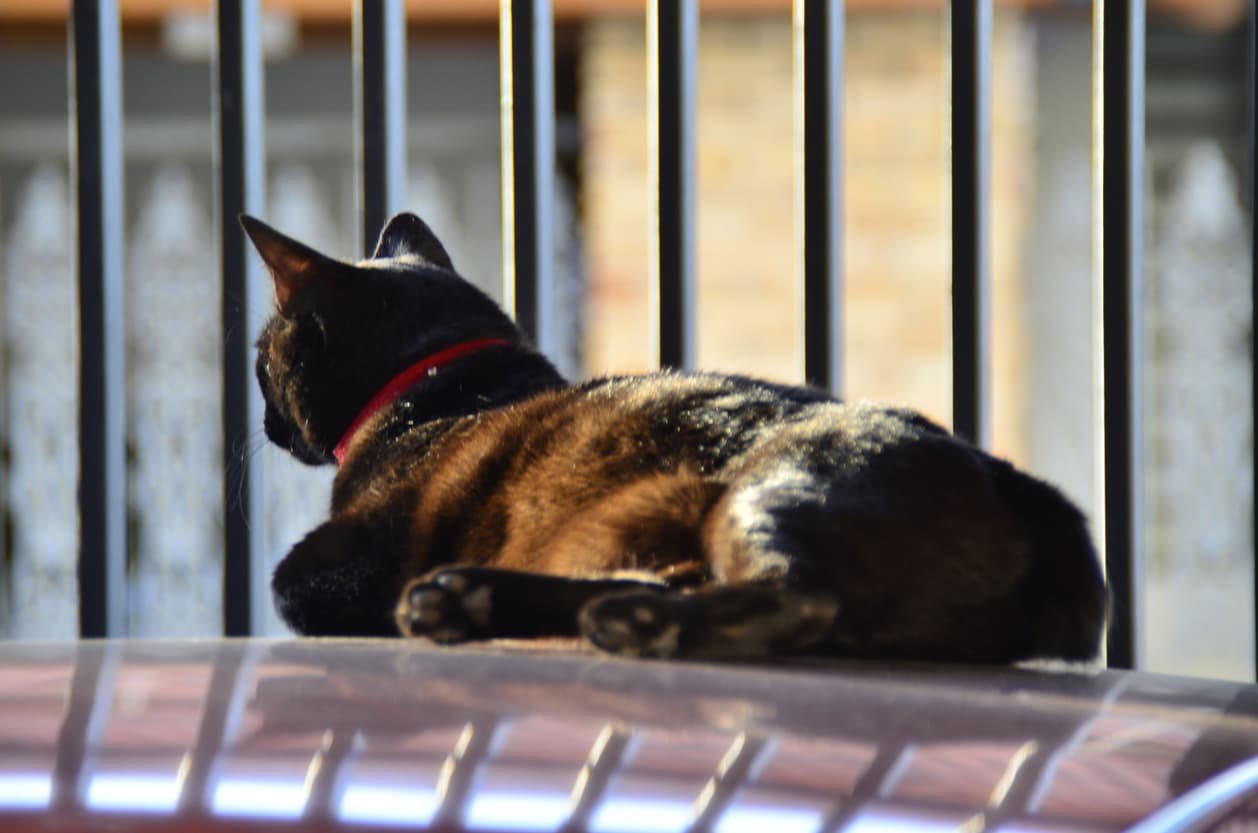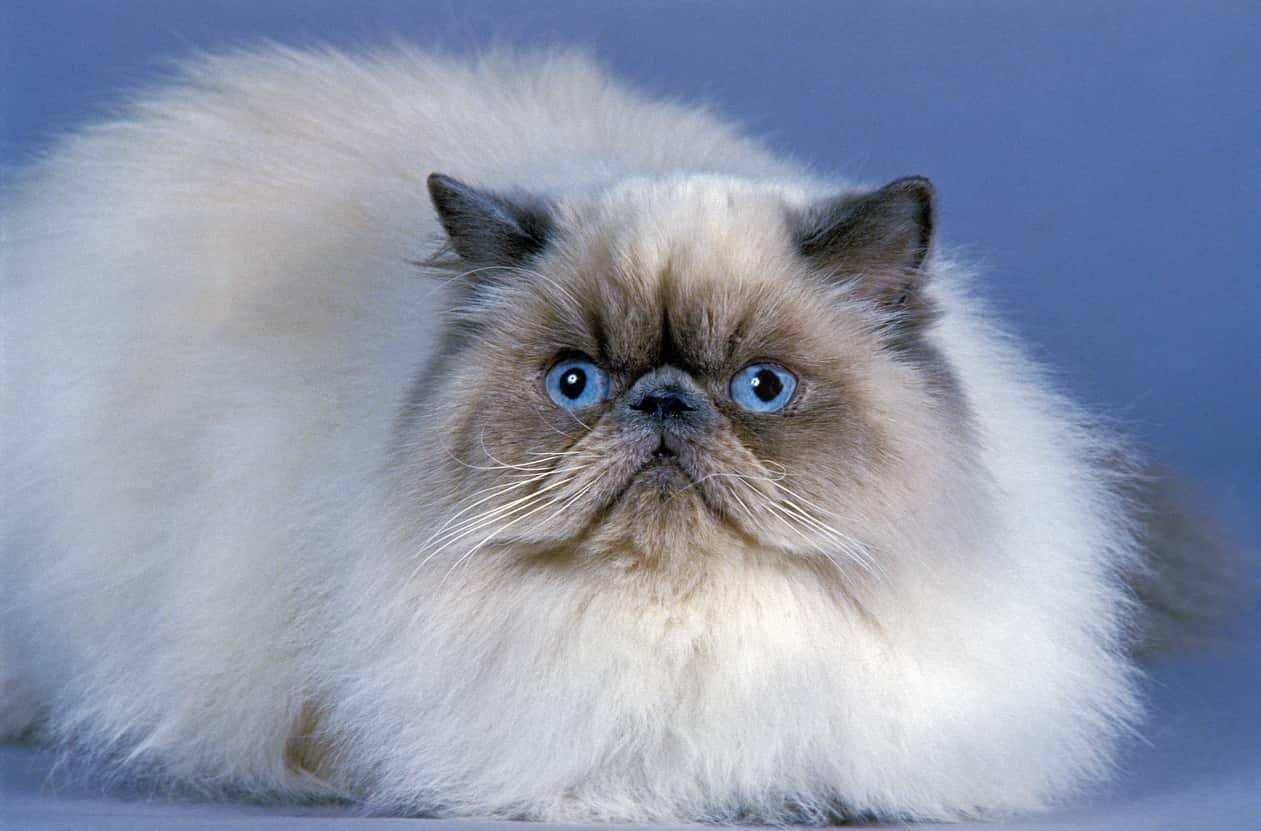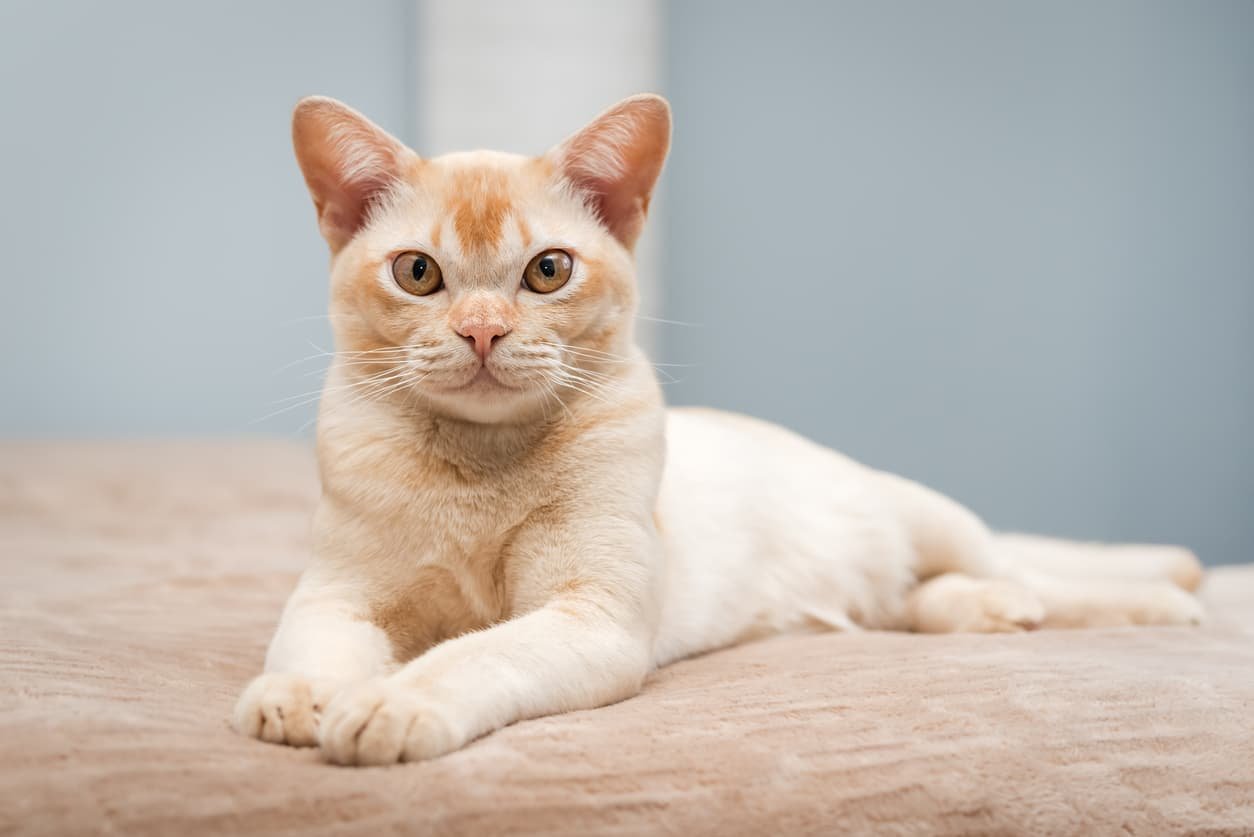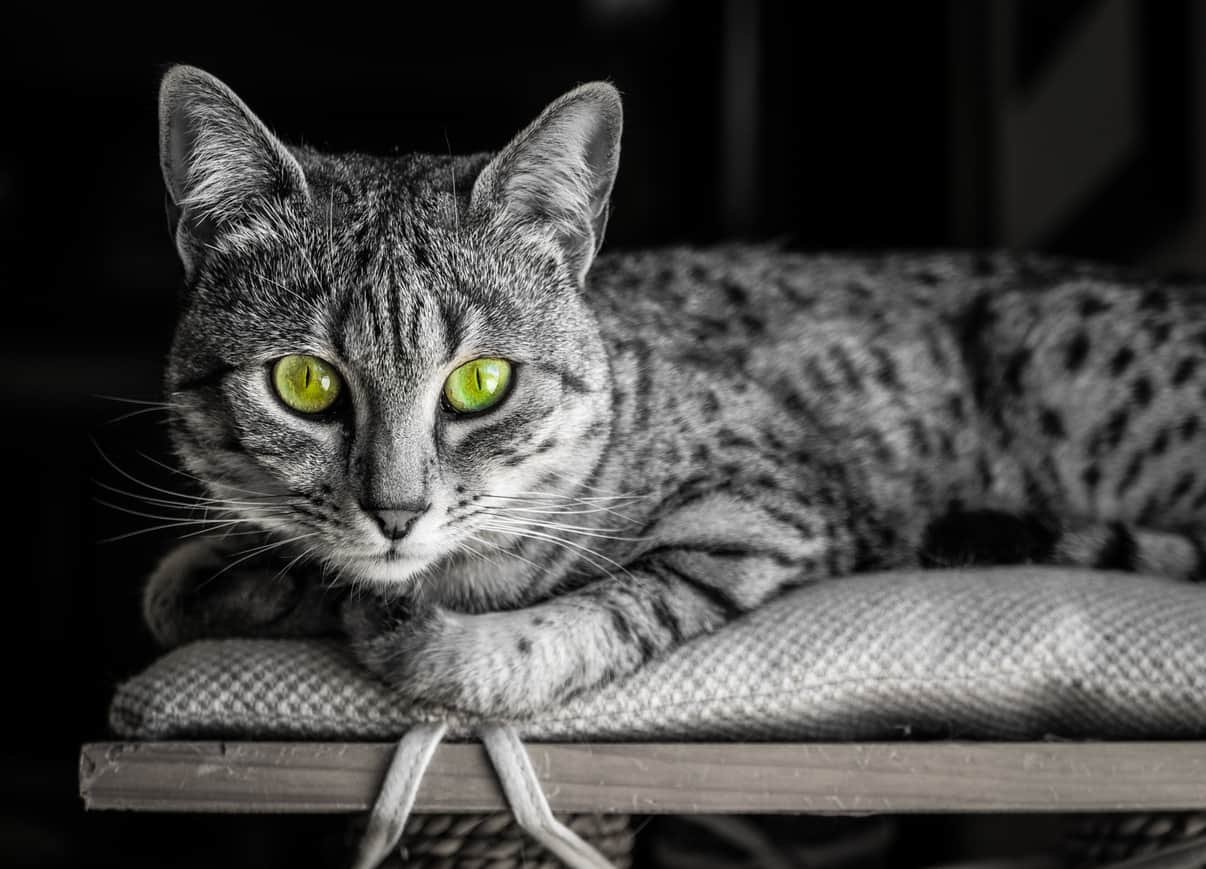Table of Contents
ToggleWhat is an Abyssinian Cat?
Historical Background
The Abyssinian cat is a unique and elegant feline known for its lithe build, large ears, and wedge-shaped head. Widely considered one of the oldest domesticated cat breeds, the Abyssinian cat has fascinated pet parents for generations with its captivating personality and exotic appearance. Despite their mysterious origin, it’s believed that the Abyssinian cat hails from the coast of the Indian Ocean, with historical links to parts of Southeast Asia. Some records also connect the breed’s introduction to Europe to a British soldier who allegedly brought an Abyssinian kitten back to England in the early 1900s.
General Breed Description
The Abyssinian is a medium-sized cat with an athletic build, fine bones, and a graceful demeanor. Its short, ticked coat comes in a variety of coat colors, including ruddy, red, blue, and fawn, which shimmer in natural light. This shimmering coat contributes to their wild, almost cougar-like look, enhancing the appeal of this popular breed.
Behavior and Popularity
Though once rare, the Abyssinian is now one of the most popular breeds among cat lovers and can be found around the world. The breed’s intelligence, curiosity, and boundless energy make it an excellent companion for active households. Unlike some cat breeds that prefer lounging, Abyssinians thrive in engaging environments and prefer to climb high places or explore extensive cat trees. Their inquisitive nature makes them excellent companions, especially for pet parents who enjoy interactive play and mental stimulation with their feline friends.
Abyssinian Cat Breed Information Table
| Feature | Description |
|---|---|
| Breed Origin | Believed to have originated in ancient Egypt; modern breed developed in Britain in the 19th century |
| Size | Medium-sized, lean, and athletic |
| Weight | Males: 8-12 lbs, Females: 6-9 lbs |
| Lifespan | 12-15 years, with some living beyond 15 years with proper care |
| Coat Type | Short, fine, and ticked with a smooth texture |
| Coat Colors | Ruddy, red, blue, fawn, and silver variations |
| Eye Color | Green, gold, or hazel, with an intense and expressive look |
| Temperament | Highly active, intelligent, curious, affectionate, and social |
| Grooming Needs | Low maintenance; occasional brushing to remove loose hair |
| Activity Level | Very high; enjoys climbing, jumping, and interactive play |
| Health Concerns | Prone to periodontal disease, patellar luxation, and progressive retinal atrophy (PRA) |
| Best For | Active families, singles, and owners who enjoy engaging, playful pets with high energy levels |
Abyssinian Cat Appearance
Physical Traits
Abyssinian cats are instantly recognizable thanks to their sleek bodies, large ears, and almond-shaped eyes. Their heads are wedge-shaped, accentuating their exotic and wild appearance. One of the most remarkable features of the Abyssinian is its coat. Each hair is ticked with multiple bands of color, creating a luminous and richly shaded effect.
Coat and Colors
This breed’s coat colors vary, with ruddy being the most traditional. Other accepted colors include red (also known as sorrel), blue, and fawn. The shimmering nature of the coat gives the Abyssinian a polished and refined appearance that sets it apart from other popular breeds.
Body and Expression
Their medium-sized bodies are muscular yet elegant, with fine bones and a slightly arched back that hints at their athleticism. The legs are long and slender, and the tail tapers to a fine point. Their overall look is that of a poised predator in miniature, exuding both strength and grace.
The breed’s expressive eyes come in gold, green, hazel, or copper and are outlined with dark markings, often referred to as mascara lines. Their large ears are set wide apart and are slightly pointed, giving the cat an alert and intelligent appearance. These features make the Abyssinian cat a favorite among show enthusiasts and casual pet parents alike.
Abyssinian Cat Personality and Temperament
Behavior and Temperament
The Abyssinian cat personality is one of the most endearing and captivating aspects of the breed. These cats are known for their playful, extroverted, and inquisitive nature. Abyssinians are not couch potatoes—they love action and thrive in environments where they can climb, explore, and interact with their humans.

Family Interaction
Despite their high energy levels, Abyssinians are deeply affectionate and form strong bonds with their families. They enjoy being involved in everything from cooking to working on your laptop. This breed is known to follow pet parents from room to room, offering companionship without being overly clingy.
They generally get along well with other pets and children, especially when socialized from a young age. However, their energetic temperament may overwhelm more laid-back animals. If you’re an active family looking for an engaging feline companion, the Abyssinian cat might be your perfect match.
Their lively personality, combined with their stunning looks, makes them a delight for any Abyssinian cat lover. With the right environment and care, these cats can be incredibly rewarding pets.
Intelligence and Training
Abyssinians are highly intelligent and can be trained using positive reinforcement methods. Pet parents often find that these cats respond well to clicker training, puzzle feeders, and interactive toys. They enjoy fetch, chase games, and even learning tricks.
Energy and Engagement
Unlike many cat breeds that are content to nap the day away, Abyssinians are always on the move. They often explore high places, climb furniture, or perch on shelves to survey their surroundings. Providing extensive cat trees and vertical space is crucial for keeping them happy and mentally stimulated.
Are Abyssinian Cats Hypoallergenic?
Understanding Allergies
Many potential pet parents wonder: are Abyssinian cats hypoallergenic? While no cat breed is entirely hypoallergenic, the Abyssinian cat is often considered a better choice for allergy sufferers compared to long-haired breeds. Their short, fine coat produces fewer allergens and sheds less, which may reduce allergic reactions in sensitive individuals.
Allergen Considerations
It’s essential to understand what being hypoallergenic actually means. The term refers to a lower likelihood of causing allergic reactions, not the complete absence of allergens. The primary cat allergen is a protein called Fel d 1, found in cat saliva, skin, and dander. Since Abyssinians groom frequently and have a short coat, the spread of this protein may be less pervasive in the environment.
Grooming and Home Care
Regular grooming is one of the top tips for Abyssinians to help reduce allergens. Brushing your Abyssinian weekly, cleaning their bedding, and maintaining a clean litter box can all contribute to a more allergy-friendly home. It’s also wise to use HEPA filters and vacuum frequently if you’re prone to allergies.
Another important step is consulting with your vet and even scheduling a visit to meet an Abyssinian before adoption to see how you react. According to VCA Animal Hospitals, pet allergies can vary greatly from person to person, and exposure to one cat breed doesn’t guarantee the same reaction to another.
Final Thoughts
In conclusion, while the Abyssinian cat is not truly hypoallergenic, it can be a suitable option for many allergy-sensitive pet parents. With proper grooming, cleanliness, and allergen management, living with an Abyssinian can still be an enjoyable experience for those with mild to moderate allergies.
Abyssinian Cat Care Guide
Living Environment
Caring for an Abyssinian cat involves more than just feeding and cleaning the litter box. These intelligent, energetic cats require mental stimulation, physical exercise, and strong social bonds to stay happy and healthy. Whether you’re adopting an Abyssinian kitten or bringing home an adult, proper care is essential.
Start by providing an environment that encourages exploration and play. Extensive cat trees, climbing shelves, and interactive toys are key elements. These cats love to jump, climb, and observe from high places, so vertical space is as important as floor space.
Grooming and Maintenance
Grooming needs are minimal but important. Though Abyssinians have short coats, regular brushing helps reduce shedding and keeps the coat healthy. This also offers an opportunity to check for any early signs of health conditions.
Nutrition and Feeding
Diet is another essential aspect. Feed an Abyssinian high-quality cat food rich in protein, as their active lifestyle demands balanced nutrition. Consult your vet about specific dietary needs, especially if your cat has food sensitivities or unique health concerns.
Veterinary Care
Vet check-ups are critical to catch common health conditions early. Pet insurance can help cover costs related to illnesses or emergencies. Companies like VCA Animal Hospitals recommend annual exams, dental cleanings, and routine screenings to monitor for genetic issues like progressive retinal atrophy.
Training and Enrichment
Socialization and training are important too. Use positive reinforcement methods to teach your Abyssinian new tricks or encourage good behavior. They thrive on attention and do best in homes where they aren’t left alone for long periods.
Financial Considerations
If you’re adopting, consider the full cost of ownership beyond the adoption fee. Budget for food, vet visits, pet insurance, toys, grooming supplies, and enrichment tools. Providing the right environment and care can help your Abyssinian cat lead a long, happy, and active life.
Abyssinian Cat Health Issues
Genetic Concerns
Like many purebred cats, Abyssinians are prone to certain genetic health conditions. One of the most common is progressive retinal atrophy (PRA), a degenerative eye disorder that can lead to blindness. Early detection is key, and reputable breeders often test their cats for PRA before breeding.
Common Illnesses
Other potential issues include periodontal disease, kidney problems, and hyperthyroidism. Keeping your Abyssinian’s teeth clean, feeding them a balanced diet, and scheduling regular vet visits can help reduce the risk of developing these problems.
Importance of Regular Vet Visits
Pet parents should ensure their Abyssinian cats receive yearly health screenings. Preventative care through trusted providers like VCA Animal Hospitals helps detect health concerns early. Investing in pet insurance can offset the costs of unexpected vet bills and treatments.
Environmental Factors
Even an outdoor cat can develop unique health issues due to exposure to parasites, toxins, and injury. It’s typically recommended that Abyssinians remain indoors or have supervised outdoor access to reduce risk.
Tips for Prevention
Maintain a clean litter box, ensure they get exercise on extensive cat trees, and provide a stress-free environment. These efforts contribute significantly to their overall well-being and longevity.
Abyssinian Cat Lifespan
Average Lifespan
Abyssinian cats typically live between 12 and 15 years, though some can reach up to 18 years with excellent care. This makes them a relatively long-lived breed when compared to other medium-sized cats.
Influencing Factors
Their lifespan depends heavily on genetics, environment, nutrition, and preventive healthcare. Pet parents should focus on minimizing risks associated with genetic conditions, such as progressive retinal atrophy, and encourage a healthy lifestyle through proper diet and regular exercise.
Preventive Healthcare
Routine veterinary care is key to prolonging life expectancy. Annual wellness visits, vaccinations, dental cleanings, and screenings for common health conditions help detect and treat problems early. Pet insurance is a worthwhile investment to help manage long-term healthcare expenses.
Diet and Exercise
Feed an Abyssinian a high-quality, protein-rich diet suitable for their energy levels. Encourage regular play sessions with the best toys for Abyssinian cats, like interactive wands, puzzle feeders, and climbing challenges that promote mental and physical well-being.
Quality of Life
Providing enriching environments—like high places, outdoor catios, and extensive cat trees—keeps them active and engaged. The happier and healthier their daily lives are, the better their chances of enjoying a long, fulfilling life.
Abyssinian Cat Training and Intelligence
Intelligence Level
The Abyssinian cat is one of the most intelligent breeds in the feline world. Their problem-solving ability, curiosity, and quick learning make them ideal candidates for training and mental enrichment.
Training Strategies
Abyssinians respond well to positive reinforcement methods. Using treats, praise, or clicker training, pet parents can teach an Abyssinian a wide range of behaviors—from basic commands to agility tricks. Training also serves to mentally stimulate the cat and strengthen the bond with its human.
Daily Enrichment
Providing enrichment is essential for Abyssinians. Rotate toys, offer puzzle feeders, and introduce new challenges like training sessions to maintain their sharp minds. Smart toys and interactive play mimic hunting behavior and reduce boredom.
Social Intelligence
In addition to cognitive skills, Abyssinians excel in social intelligence. They can often sense moods and routines, and many learn to open doors, fetch toys, or even perform tasks like turning on light switches with practice and encouragement.
Abyssinian Cats vs Other Breeds
Abyssinian vs Somali Cat
One of the most frequent comparisons among cat lovers is between the Abyssinian cat and the Somali cat. The Somali is essentially a long-haired version of the Abyssinian and shares many of the same traits, including personality, intelligence, and body structure. However, Somali cats have more luxurious coats and require more grooming. Abyssinians, with their short coats, are easier to care for and produce fewer allergens—making them a better choice for allergy-sensitive pet parents.
Abyssinian vs Siamese and Bengals
Compared to Siamese cats, Abyssinians are less vocal but equally intelligent and active. While Siamese cats demand constant interaction, Abyssinians are more independent but still highly sociable. Bengals, on the other hand, are also energetic and wild-looking, but they are usually larger and require even more physical stimulation. Abyssinians strike a balance between being active and being content indoors with the right enrichment.
Ideal Homes for Each Breed
Abyssinian cats are well-suited for families looking for an athletic, intelligent, and visually striking companion. Their loyalty and low-maintenance coats make them easier for new pet parents, especially compared to the grooming needs of a Somali cat or the high-energy requirements of a Bengal.
Best Toys and Accessories for Abyssinians
Mental and Physical Stimulation
The best toys for Abyssinian cats are those that challenge their minds and keep them physically engaged. Puzzle feeders, treat balls, and interactive electronic toys help keep them entertained while sharpening their problem-solving skills.
One excellent option for both play and relaxation is the Viyno Cat Tunnel Bed, available at cattunnelbed.com. This multifunctional product serves as a cozy resting spot, hideaway, and interactive play tunnel that taps into your Abyssinian’s natural instincts to explore and chase. It’s especially well-suited for this energetic breed and makes a stylish addition to any home.
Climbing and Jumping
Because Abyssinians love high places, investing in extensive cat trees, climbing shelves, and wall-mounted platforms is essential. These structures provide the physical activity they crave and reduce destructive behaviors.
Favorite Toys
Wand toys that simulate prey movements are among the top picks. Laser pointers, feather toys, and toy mice are also favorites. Rotating these toys keeps the experience fresh and exciting for your Abyssinian kitten or adult cat.
DIY Enrichment
DIY cardboard boxes, tunnels, and hiding spots offer inexpensive ways to create stimulating environments. Pet parents can even rotate items weekly to maintain novelty. In addition to cognitive skills, Abyssinians excel in social intelligence. They can often sense moods and routines, and many learn to open doors, fetch toys, or even perform tasks like turning on light switches with practice and encouragement.
Is the Abyssinian Cat Right for You?
Lifestyle Compatibility
The Abyssinian cat is a great fit for active individuals or families who can commit time to interactive play and mental enrichment. Their need for stimulation makes them ideal for people who are home frequently or who can provide a dynamic environment.
Pros and Cons of Abyssinian Cats
Pros:
Stunning coat colors and appearance
Extremely intelligent and trainable
Low grooming needs
Social and affectionate
Cons:
Can become bored or destructive without stimulation
Not ideal for quiet households
May overwhelm more docile pets
Final Considerations
If you’re ready to provide an enriching home and companionship to a medium-sized cat with a big personality, the Abyssinian cat could be a rewarding addition. Be prepared for a lifelong companion that thrives on activity, affection, and engagement.
From their origins along the coast of the Indian Ocean to their popularity among modern pet parents, Abyssinian cats continue to be one of the most fascinating and interactive companions in the feline world.
FAQ
What is unique about Abyssinian cats?
Abyssinian cats are unique for their ticked, multicolored coat, high energy, and playful, dog-like personalities. They’re intelligent, curious, and love climbing, making them one of the most active and engaging cat breeds.
What is the personality of Abyssinian cats?
Abyssinian cats are playful, curious, and affectionate. They’re highly intelligent, love interactive play, and enjoy being involved in everything their humans do—often forming strong, loyal bonds.
How active are Abyssinian cats?
Abyssinian cats are extremely active and energetic. They love climbing, exploring, and interactive play. Expect them to stay busy, curious, and constantly on the move throughout the day.
What is the origin of Abyssinian cats?
Abyssinian cats are believed to have originated in ancient Egypt, but the modern breed was developed in Britain in the 19th century. They’re named after Abyssinia (now Ethiopia), where early specimens were reportedly imported from.
Is the Abyssinian cat rare?
Yes, Abyssinian cats are considered relatively rare compared to more common breeds. Their unique coat, high energy, and engaging personality make them sought after, often available only through reputable breeders.
What are the Abyssinian cat colors?
Abyssinian cats come in several beautiful colors, including ruddy (reddish-brown), red (sorrel), blue (grayish-blue), and fawn (light beige). Each coat features a distinct “ticked” pattern with multiple bands of color on each hair.
Are Abyssinian cats good for first-time pet parents?
Yes, Abyssinian cats can be a great choice for first-time pet parents who are active and willing to provide regular mental and physical stimulation. Their affectionate yet independent nature, low grooming needs, and strong intelligence make them both manageable and rewarding companions.
How do I feed an Abyssinian to support their active lifestyle?
To feed an Abyssinian properly, choose a high-protein, grain-free diet that supports lean muscle development and energy. Incorporate small meals throughout the day and use puzzle feeders or treat balls to encourage mental stimulation during mealtime.
What are common health conditions in Abyssinians?
Abyssinians may be prone to genetic health conditions such as progressive retinal atrophy (PRA), periodontal disease, and kidney issues. Regular veterinary visits, early screenings, and pet insurance are essential to manage their long-term health.
Are Abyssinian cats indoor or outdoor cats?
While some Abyssinians may enjoy supervised outdoor time, they are generally safer and healthier as indoor cats. Their curious nature makes them prone to accidents or getting lost, so a secure outdoor catio or leash training is recommended for outdoor enrichment.

